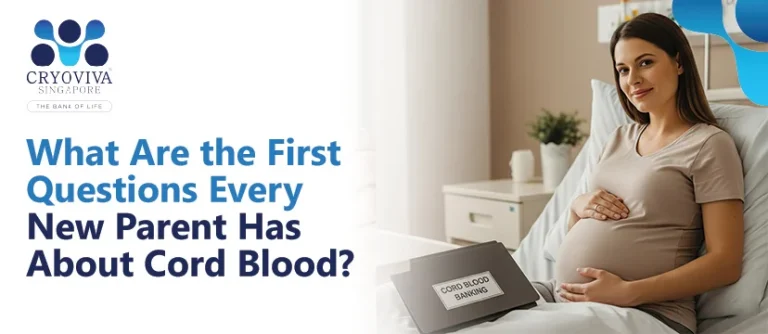- Why Cryoviva
- Events & Workshops
- Blogs
- Contact Us
- Book an Appointment
- Mission & Vision
- COO’s Message
- Scientific Team
- Privacy Policy & Disclaimer
- Cord Blood Stem Cells
- Cord Blood Collection Process
- Cord Blood Storage Process
- Cord Blood Stem Cells Treatment
- Cord Blood Testing
- Clinical Trials
- VIVA SuperCell®
- FAQs
- Pay Online
- Update Your Information
- Share the Care Referral
- Downloadable Form
- Transfer of Cord Blood
Blog
What Are the First Questions Every New Parent Has About Cord Blood?

Just a few days or weeks more, and you are about to hold your newborn for the very first time. It’s a moment you’ve been dreaming of for months, filled with joy and a touch of nervousness.
Amidst all this, you might have come across the concept of saving your baby’s cord blood via private cord blood banking in Singapore. It is the method of storing the baby’s blood from the umbilical cord right after birth. Think of it as a shield, a thoughtful step to secure their future.
But as a new parent, it’s natural to feel uncertain about what cord blood is, whether it is safe, and whether it’s really needed. Cryoviva Singapore has answered these questions in a comprehensive manner, helping you make the choice with conviction and confidence.
Common Questions About Cord Blood: Answered for Expectant Parents
Continue to read to remove your doubts about saving your child’s cord blood for a future safety net.
Why is cord blood taken at birth?
You have heard that cord blood is collected right after birth, but why? Because it’s rich in unique stem cells that can potentially save lives from serious diseases. These cells can help manage serious conditions, including leukemia, blood disorders, and immune system disorders.
As a new parent, storing your baby’s cord blood means you’re preserving a natural weapon with the potential to treat nearly 80 diseases. It’s a once-in-a-lifetime chance to give your child and family a valuable future medical safeguard.
Also Read: Things I Wish I Knew About Cord Blood Banking Before Giving Birth
What diseases can umbilical cord blood cure?
Umbilical cord blood can treat over 80 diseases, particularly blood and immune system disorders.
A few of them are:
Leukemias like Acute Lymphoblastic Leukaemia
Lymphomas (a group of blood and lymph cancers)
Anaemias, sickle cell disease (an inherited blood disorder)
Inherited immune disorders such as severe combined immunodeficiency (SCID)
Metabolic diseases like Hurler syndrome (buildup of large sugar molecules)
Bone marrow failures
Certain solid tumours, like neuroblastoma (cancer of immature nerve cells)
Ongoing research on cord blood stem cell treatment shows promise in addressing autoimmune, heart and brain conditions.
Is cord blood banking safe or not?
Cord blood banking for stem cell preservation in Singapore is safe and painless. The blood is collected right after the baby is born and the umbilical cord is cut, making sure that neither mother nor baby feels any pain or risk. The process takes only a few minutes, and trained professionals handle everything to ensure safety and proper storage.
Does cord blood banking interfere with the delivery process?
The cord blood collection process does not interfere with the delivery of your baby, as the collection happens right after the baby is born. The umbilical cord is clamped and cut without any harm to you and your baby.
What is a stem cell banking kit or cord blood collection kit?
A stem cell or cord blood collection kit has all the tools your doctor needs to safely collect and store your baby’s cord blood at the time of birth. It safeguards the stem cells by keeping them at the required temperature until they reach the laboratory for processing, ensuring the cells remain future-ready. If you have selected Cryoviva Singapore for private cord banking, make sure to carry the cord blood collection kit in your hospital bag.
Also Read: What to Pack in Your Hospital Bag: Beyond the Essentials
Is cord blood the mom’s or baby’s blood?
Cord blood is the baby’s blood that remains in their umbilical cord and placenta right after birth. The umbilical cord connects the baby to the placenta to transfer nutrients and oxygen but keeps the baby’s and mother’s blood separate. So, cord blood belongs to the baby and it is legally considered the child’s property.
How long should I keep my child’s cord blood?
When stored right, you can keep stem cells fresh and ready to help for 20, 30 years or even longer. There has been evidence that cord blood kept frozen for decades still works well, making it a smart way to protect your child’s future health. That’s why many parents in Singapore are opting for it.
Conclusion
Cryoviva Singapore believes asking the right questions and getting accurate and transparent answers is crucial when your baby’s future health is on the line. It’s crucial to know the facts, not myths. To safeguard your child’s and family’s tomorrow, contact us today for expert guidance and trusted cord blood or stem cell preservation banking services.
FAQ's
What is Cord Blood and why is it important for newborns ?
Cord blood contains powerful Stem Cells that may help treat various medical conditions.
Is Cord Blood collection safe for both Mother and Baby ?
Yes, it is completely safe and done after delivery without affecting birth.
What conditions can Cord Blood help treat ?
Cord Blood is used in approved treatments for blood disorders, Immune diseases, and certain Cancers.
How is Cord Blood collected and processed ?
It is collected immediately after birth, securely transported, and processed in a certified lab like Cryoviva Singapore.
Why should parents consider Cord Blood banking ?
It provides long-term medical security and access to Stem Cells for future treatments.


